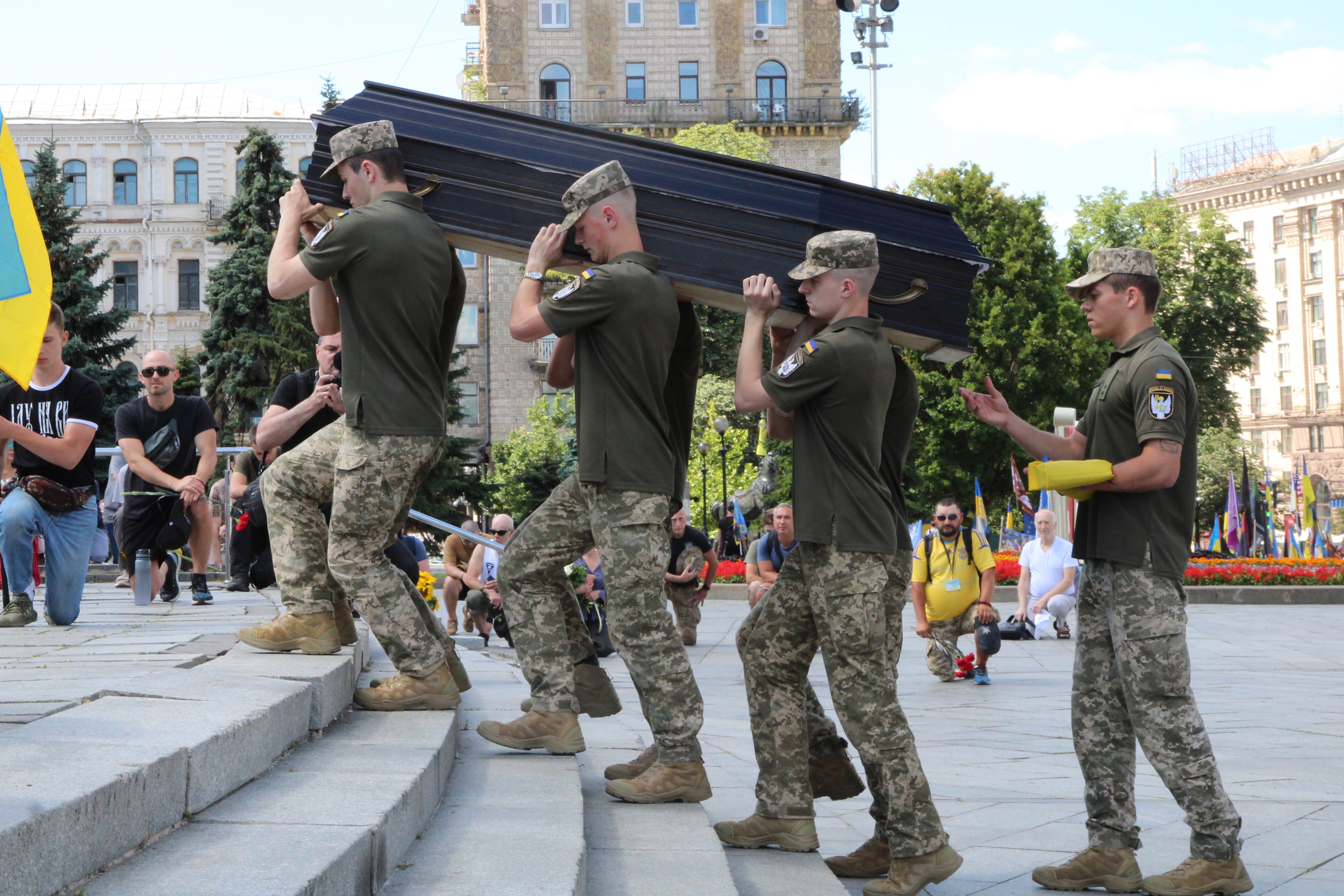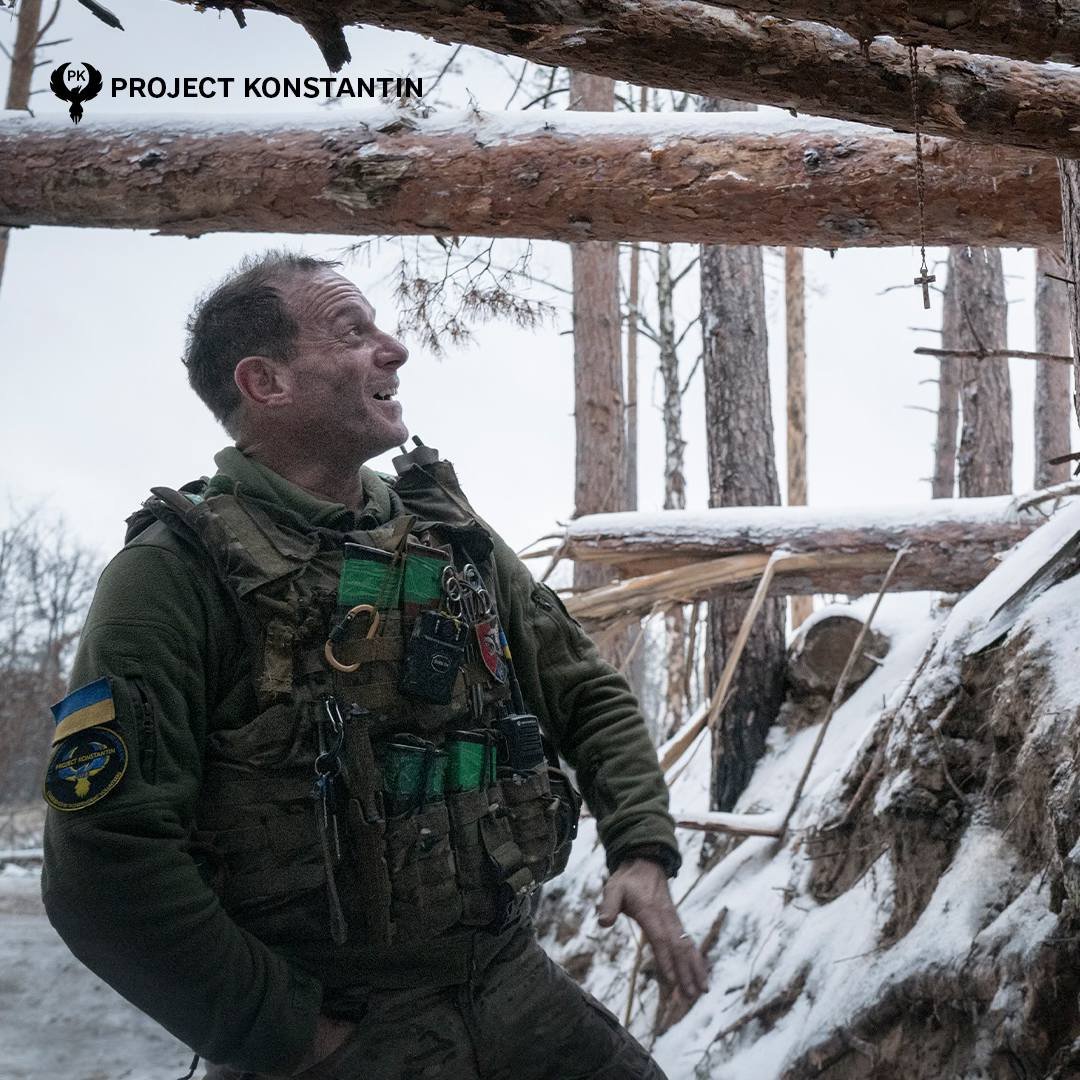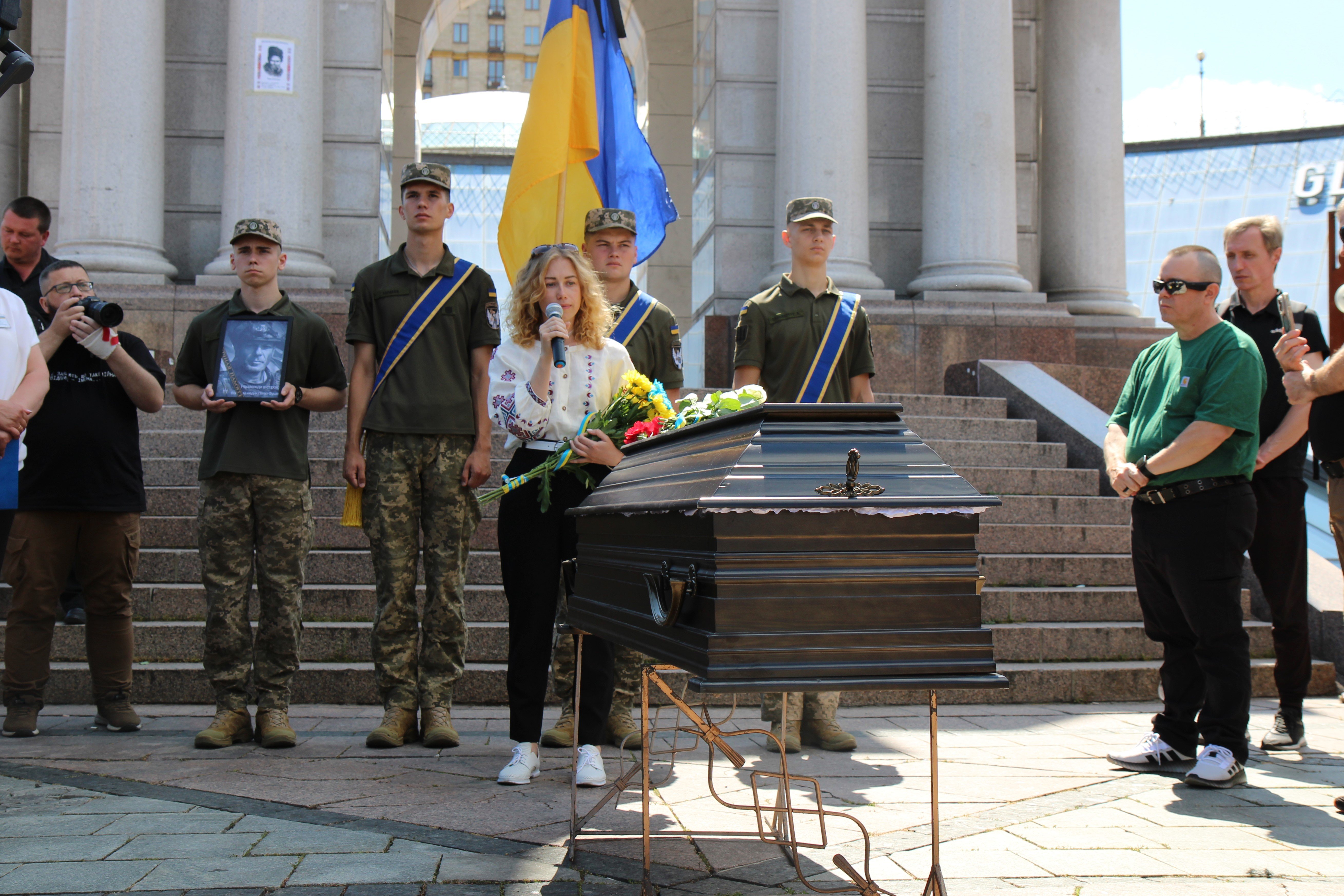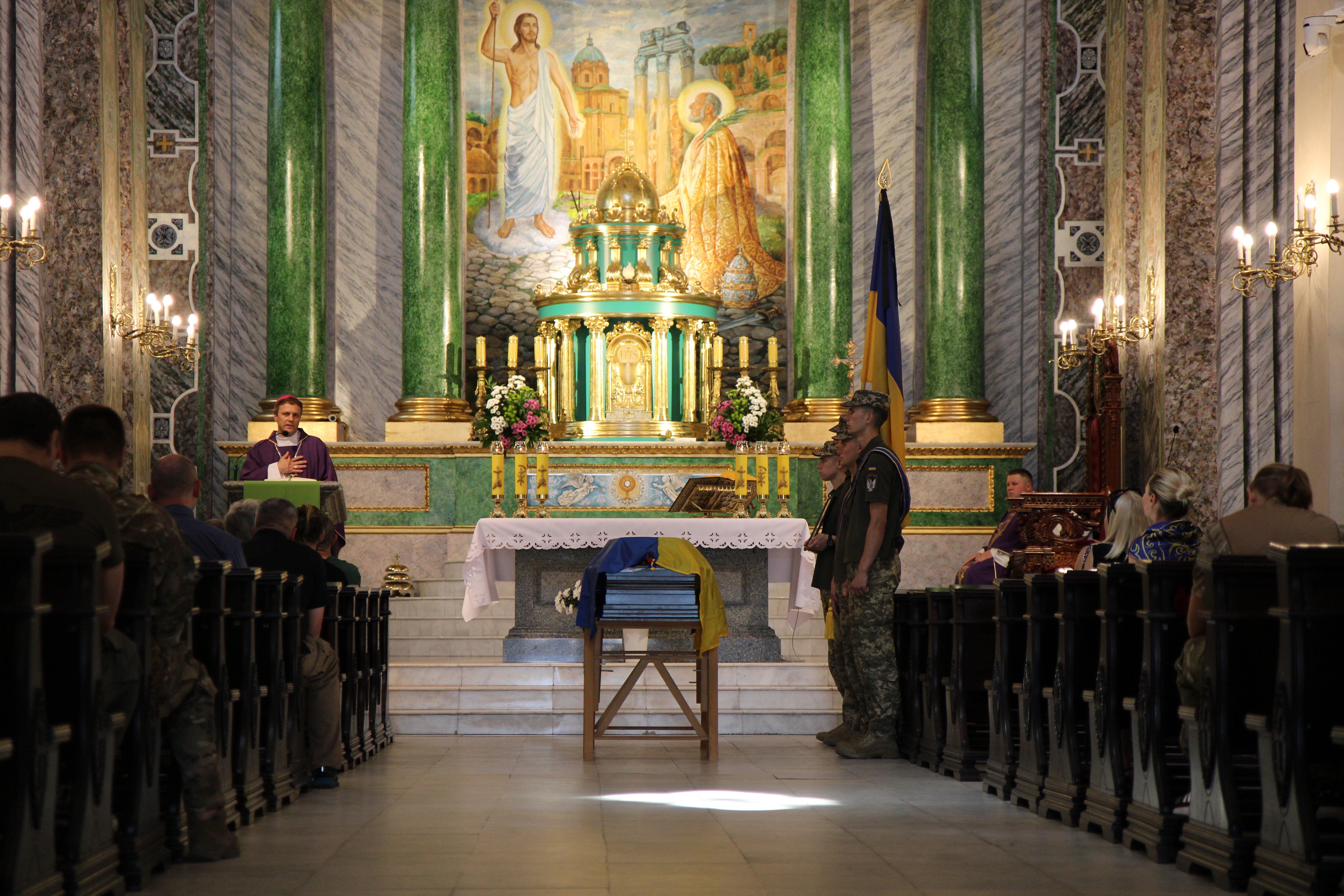"I'm ashamed to be a Westerner": who was the British soldier who joined the Armed Forces of Ukraine
In February 2024, a video went viral on social media in which British paramedic Peter Fouché addressed the governments of Western countries and said, barely holding back tears, "I am ashamed to be a Westerner." Long months of aid blockage in the US Congress, coupled with what Peter deemed insufficient support from other countries, led to the British volunteer's pain and frustration. A few months later, in June 2024, Peter Fouché died.
We recall who Peter was, why he decided to move to Ukraine and join the Armed Forces of Ukraine, how he combined service with volunteering, and why he said he was ashamed to be a Westerner.
The suffering of children
On a hot summer Saturday, a few dozen people dressed in military and black clothing gathered on Independence Square in Kyiv. While the sun glints in the windows and people on the other side of the road stroll through the hot city, a black closed coffin stands in the shadow of the Independence Monument. Peter Fouché lies in it, and his comrades, friends, and family have come to see him off today.
One by one, Peter's loved ones come to the microphone to say a few words about him. They all recall his bravery and bright soul.

Peter Fouché was an extraordinary man. At the beginning of the full-scale invasion, the South African-born Briton left London to help Ukrainians. He transported humanitarian aid from London to Ukraine and joined the Territorial Defense Forces to take part in the humanitarian missions after the Kyiv and Chernihiv regions' de-occupation.
"After the de-occupation of Chernihiv region, we immediately decided to go on a humanitarian mission to this region, when there was still military equipment in the fields and on the roads, and smoke was still coming from it," said his comrade-in-arms, who had known him since the first days of the full-scale invasion of Ukraine, at Peter's funeral. – "Then we fed hundreds of people who were still hiding in basements and did not understand who came to them - whether it was still the occupiers or Ukrainian soldiers."
Peter's motivation to come to Ukraine was not political but moral — he could not bear to see the suffering of Ukrainian children. Peter also has a kid — his teenage daughter Nicola, who lives in London.
"I see what is happening to children from Ukraine, and I cannot let it happen to my child," Peter once told his commander during a combat mission.
This motivation became the cornerstone of Peter's life during the war and helped him to transform all challenges into new opportunities.

Militarization
Later, Peter went to eastern Ukraine on several more humanitarian missions and decided to stay in this area to help civilians and the military. Peter founded the charity foundation Project Konstantin, named after a close friend of Fouché's whom he met in the Territorial Defense Forces, soldier Kostia.
Peter's foundation evacuated wounded soldiers from difficult areas of the frontline, collected aid for the military, and delivered it to the front.
But over time, Peter felt that his volunteer work was not enough, recalls Halyna Zhuk, Peter's colleague and friend.
"A year and a half ago, just when I joined the foundation's team, it was a turning point for many volunteers in Ukraine," recalls Halyna Zhuk. — "At the beginning of the full-scale war, people abroad were looking for volunteers in Ukraine to send something, but in 2023, everything changed — you just couldn't find any help. And many volunteers decided that if they had nothing to send to the military, they would help with their hands at the frontline. Peter had the same thought on his mind."

In November 2023, Peter signed a contract with the Ukrainian Armed Forces and began serving as a soldier and military medic. However, he continued to volunteer, and his service at the front helped him understand what the military needed most.
"Peter was a medic, a fighter, and an effective volunteer: despite his organization being small, he helped us a lot as a volunteer," says Peter's commander, who goes by the call sign Loza.
The need
Peter went to the frontline to see what help the military needed. He saw that the demand far exceeded the supply. Because of the weak military aid from Western countries, Peter watched with despair as the war claimed more and more lives of his brothers in arms. This frustrated Fouché and he poured out his pain in a famous viral video in which he said he was ashamed of being a Westerner.
"The despair he felt as a volunteer, as it was getting harder and harder to find military assistance, joined the despair of the Ukrainian people because we were offered so much help, but most of it was just lip service," Halyna recalls. — "And the help we received was a drop in the ocean compared to our real needs. Peter went to the war to see what the military needed, and from the very first days, he saw how great the demand for equipment was. When he signed the contract, the brigade he joined was sent on rotation due to heavy losses. He decided to draw attention to this problem and express his despair in this video."
The video did not succeed in changing the policies of Western governments, but it did bring the war in Ukraine back into the focus of ordinary people. The Fouché's foundation began to receive more donations.
Like a father
Despite all the difficulties Peter was going through, he continued to be an empathic and bright person.
"Even in the most difficult situations, he always smiled," says Loza. — "He was always able to tell a good person from an evil one from the first meeting. He was a ray of light in the darkness of this war. He never refused to perform tasks, always tried to do something more - he pushed himself, even when exhausted."
At Fouché's funeral, a man named Volodymyr said Peter was like a father to him. Volodymyr is an employee of the Kharkiv State Emergency Service who lost his father while responding to the aftermath of Russian shelling. His father was killed when a Russian drone hit the scene of the tragedy again.
"Volodia and Peter met in 2022 while delivering humanitarian aid in the Kharkiv region," says Halyna Zhuk. — "They worked together and were friends, and Peter knew Volodia's father, Vladislav. Volodymyr helped our foundation repair evacuation vehicles, so we kept in touch constantly.
And then, a few months ago, the news broke that a drone strike had killed three rescuers in Kharkiv. In the morning, I wrote to Volodia: "Please tell me you're okay," and he replied that his dad had been killed. We all experienced this situation very painfully. Peter was very supportive of Volodya, constantly talking to him and helping him. Their relationship became truly family-like."
Love you forever
Peter died in June 2024 during a combat mission. A few weeks before his death, Peter's mother, 87-year-old Rose, came to visit him near the war zone in the East.
"The last memory I have of him is me taking a video, and he was shooting in the air with an imaginary machine gun and waving to me," recalls Peter's commander, Loza. — Peter was in charge of the position during his last combat deployment because he was the most experienced. He was positioned very close to the enemy, waiting for more soldiers from our battalion to arrive. He was sitting in a protected dugout, and an enemy 88 mm mine fell near him. As far as we know, the shrapnel hit a small window and injured Peter's head. Doctors managed to get to Peter only after 20 minutes and pronounced him dead."
The fighting in this area was so intense that Peter's body could be evacuated only a few days later, says Halyna Zhuk. "It was such a difficult area that Peter recorded a farewell video for his family while going out on this position," says Halyna.
Peter's body was brought to Kyiv, and an honorable funeral ceremony was held there.
Peter was a very religious man. He wore a chevron on his uniform with the inscription "In God we trust." After the ceremony on Independence Square, Peter was buried at St Alexander's Catholic Cathedral in Kyiv.

"It was his favorite cathedral," says Halyna Zhuk. Before signing the contract with the Armed Forces, Peter spent all his Sundays here when he was in Kyiv".
A message from his family was read out during the liturgy in the cathedral.
"Dad, when you asked me if you could go to Ukraine, I told you to go," reads a letter from Peter's daughter, Nicola, "But I said make sure to come back. And Dad, I want you to know that you came back, just like you promised, in my heart. I will love you forever, Dad."
At the request of Peter's mother, part of the ashes went to his family, and part remained in Ukraine.
Follow this link to donate to Project Konstantin, Peter's foundation. The foundation currently provides technical support to the Ukrainian military.

